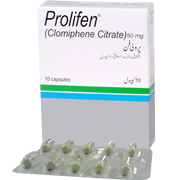
Treatment with Prolifen 50 mg Capsules generally has little effect in patients with hypophyseal deficiency or primary amenorrhea precluding the possibility of stimulating normal functioning. Prolifen cannot obviously be considered as a replacement for specific treatment of alterations in other organs that may cause anovularity (thyroid, adrenal glands, etc.).
When to Avoid Prolifen?
- Pregnancy
Since Clomiphene (the active ingredient of Prolifen 50 capsules) causes abortions and fetal malformations in rats or rabbits, it should not be administered during pregnancy. To avoid this situation, it is necessary to examine ovulation exactly, measuring the basal temperature during all the treatment cycles. - Liver Disorders
Since Prolifen is metabolized in the liver, it must not be administered to patients with liver alterations. Dubious cases require clinical and laboratory tests to examine hepatic functions. - Menometrorrhagia
Prolifen is contraindicated in patients with Menometrorrhagia. - Visual Disturbances
Prolifen is contraindicated in patients with past or present visual disorders. Dubious cases should be referred for an ophthalmic examination. Patients should be warned of the possible onset of visual disorders and blurring of vision during treatment with Prolifen 50mg Capsules. These disorders can interfere with some operations that require particularly acute vision, especially under variable light conditions (driving a car, operating machinery, etc.). If they appear, treatment with Prolifen should be suspended.
Related Links
- Prolifen Dosage
- Prolifen Side Effects
- Effects of Prolifen on Pregnancy
- Special Warnings (must read)
- Cerophene
Leave A Comment